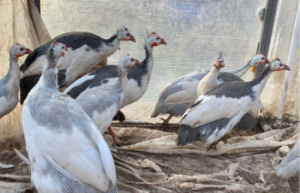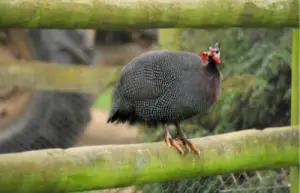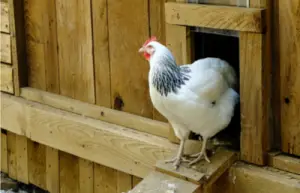Can You Keep Guinea Fowl With Chickens?
If you have considered adding guinea fowl to your flock of chickens, you have likely wondered what challenges you might face while integrating the two species. Can guinea fowl and chickens live together successfully?
The short answer is yes, you can keep a mixed flock of guinea fowl and chickens. Many backyard farmers successfully keep the two species together, and so can you if you are willing to make a few accommodations to meet the unique needs of both birds.
While chickens have been domesticated for centuries and rely on humans for survival, guinea fowl are largely independent, thriving in the African wild. This presents a few unique differences in keeping the two species together. Continue reading to learn everything you need to know before keeping guinea fowl with chickens!
Things to Consider Before Keeping Guinea Fowl With Chickens
We have kept guinea fowl with our chickens before, and it I would say it was successful, although we did have to learn some things along the way. Here are some things that I learned when it comes to integrating your Guinea Fowl and chickens:
More wild by nature, guinea fowl are known to wander a great deal more than chickens. This initially was a problem for us because a few of our Guinea Fowl wandered off and never came back. Others would escape into the neighbor’s yard and end up in the chicken coop with their chickens. 🤦♀️ Understanding this aspect of Guinea Fowl behavior is important before purchasing these birds.
In addition, while chickens aren’t great at flying, guinea fowl are able to reach heights of up to 500 feet. I would be surprised when I would walk outside and have a Guinea Fowl swoop over my head from one of the tall trees on our property.
Other considerations are that guinea fowl aren’t always inclined to roost with chickens in an enclosed space at night without some convincing, and their diets differ slightly from that of chickens. The good news is if you start introducing Guinea keets (babies) to a coop and covered pen early on, they will easily accept it as adults.
Guinea Fowl Tend to Wander More Than Chickens
As I mentioned above, I found out the hard way that Guinea Fowl like to wander off. Another aspect of that is a group of Guinea Fowl will ALWAYS stay together, so if one wanders off, the others will follow too. One way you can counteract this is by raising young guinea keets with young chickens. This way, the birds can bond and the Guinea Fowl will incorporate the chickens into their group. They’ll be more likely to stick around and stay with the chickens than they will be to fly away.
With chicks and keets, you will likely have them in a brooder or safely locked in the coop day and night until they are old enough to venture out on their own and explore. When it is time to let them wander a bit, let one keet out first. Make sure you are keeping watch, as they will be vulnerable to predators, especially at this young age. The keet will be more inclined to return to the coop after a bit of exploration, to the safety of the flock. The next day, let two keets out in the same manner.
How to Contain Guinea Fowl and Chickens 
Chickens are poor flyers and as such, are relatively simple to contain in a pen with tall fencing. While guinea fowl tend to hang out on the ground, they are strong flyers, flying up to 400-500 feet in one leap. This presents additional challenges when it comes to keeping them safe in an enclosure.
Keeping your guinea fowl from flying off into the sunset will be easier if you train them to return to the coop each night, as outlined in the previous section. Raising them from a young age with chicks can often lead to the guinea fowl mimicking some chicken behaviors – including coming back to the coop at night with the rest of the flock. If this is the case, flying may not present a problem for your guinea fowl.
If you are concerned your guinea fowl will not return to the coop, you can also enclose the run with a roof or chicken wire. This will ensure the birds cannot escape, flyers or not.
While wing clipping is a good option for chickens, it is not usually successful for Guinea Fowl. Guinea fowl have been known to fly over 5’ fencing with clipped wings. In addition to being ineffective, it can make it more difficult for them to evade predators if and when they do need to escape.
Will Guinea Fowl Roost and Nest With Chickens? 
Guinea fowl aren’t inclined to roost with chickens at night without some training. Because guinea fowl can fly and tend to wander, it is common for guinea fowl to roost in the trees, or on top of a barn or shed. Depending on the predators that are in your area, this can turn your birds into easy prey for nighttime predators. While guineas roost high above the ground, their horrible senses do them no favors in the night against birds of prey.
If you have been keeping chickens, you know that chickens will instinctively “go to bed” at dusk. This is natural chicken behavior and does not usually have to be taught. On the other hand, guinea fowl are used to roosting in the wild and will seek out a nearby tree limb or fence post to roost on at night. Guinea fowl tend not to be comfortable entering a dark space at night, so to entice them to come into their coop at dusk, consider adding a light source to the coop (along with the treats, of course!). You can turn the light off when you go outside to close the coop doors.
Nesting Differences of Chickens and Guinea Fowl
Chickens are known to seek out a quiet, private space to lay eggs, but this is even more important to the Guinea Fowl. While they may lay their eggs in the coop, it does not come naturally to them to lay in a typical nesting box, as chickens will. Guinea fowl will likely create their own “nest”, and it will be up to you to locate it!
Guinea fowl tend to lay eggs communally. If you raise chickens, you have likely seen the squabbles hens can get into over a particular nesting box. Unlike squabbling chickens, guinea fowl will often lay in the same nest – sometimes taking turns sitting on the clutch of eggs while the male stands guard to protect them during the day.
Differences in How and What Guinea Fowl and Chickens Forage
There are a couple of key foraging differences between chickens and guinea fowl. Chickens scratch deeply and with focus, searching for grubs and beetles in the dirt. Guinea fowl do not scratch as intently as chickens – instead searching and hunting for bugs and small critters on top of the ground.
This makes guinea fowl both excellent hunters and effective pest control. Guinea fowl are praised for their natural ability to control pests like ticks and mites. They will also hunt small snakes, scorpions, snails, and small rodents. Remember – guinea fowl are more inclined to live in the wild, relying on their own instincts to stay alive and fed.
Guinea fowl will also pick the garden pests off of your vegetables – but keep an eye on them, as they will also eat flowers and other vegetation.
Regardless of whether your flock free ranges or is contained in a run, you will likely have to supplement their foraging with commercial feed. Guinea fowl can eat the same feed that you give to your chickens. Just make sure you do not feed medicated chicken feed to guinea fowl – the medication can be toxic to them.
Benefits of Keeping Guinea Fowl and Chickens Together
Many keepers who have a mixed flock of guinea fowl and chickens would say there are tons of benefits to doing so! While you will need to make some accommodations if adding guinea fowl to your existing flock of chickens, there are also many advantages:
Pest Control
As stated above, guinea fowl are excellent pest control! Being largely wild, they are adept at hunting for their meals – making your job at keeping pests at bay easier.
Sound the Alarm!
Guinea fowl are loud. While this may preclude them from being kept in many suburban backyards, there are also advantages to their noise. The alarm they sound can both be a deterrent to predators, and can also give the rest of the flock sufficient time to find cover. Of course, this alarm is not only sounded after a sighting of a coyote or a hawk – guinea fowl will also sound their alarm at a plane, a neighborhood cat, or a tumbleweed.
Eggs
While guinea fowl do not lay as regularly as chickens, their egg-laying abilities should not be overlooked. Guinea fowl can lay quite well on a seasonal basis – usually around 100 eggs annually in the Spring and Fall. While this is a matter of opinion, many say that the eggs of a guinea fowl are richer and tastier.
How to Introduce Adult Guinea Fowl Into a Flock of Chickens
As with any flock addition, you will need to add adult guinea fowl to your flock of chickens slowly, and in pairs. Never add a single guinea fowl into an existing flock, as there will be a greater likelihood that the singleton may be bullied and harmed. If there are any disagreements between Guinea Fowl and chickens, the Guinea Fowl will win. Take special care with male Guineas – male Guinea Fowl can be particularly assertive and may take issue with a resident rooster.
If you are adding adult Guinea Fowl to your existing flock of chickens, it may be best to let the Guinea Fowl have their own, separate coop. This way, you can introduce them into the coop, leaving them in the coop for several days to train them that the coop is their home.
Make sure to give them treats in the coop – this will help to entice them inside, particularly if you are giving them treats in the evening. There is no foolproof way to ensure adult Guinea Fowl imprint on their home and return each night – but treats will help!
To learn more about Guinea Fowl, check out my article How Long Guinea Fowl Live & Other Interesting Facts.
